Text
Write your book STEP BY STEP
hello hello, it's me again!
today i'm bringing you a step-by-step / checklist to finally get your book done. i know it can be a bit complicated to put everything together to make your idea come to life (you're definitely not alone!)
that's why i compiled some tips and made this post, in hopes to help some author out there :D
let's get started.
PREMISE
assuming you already have a good idea in mind, you should start by writing a premise. to help you with that, try to answer these questions:
who is the main character?
what are their goals?
which troubles will they face / what's stopping them from achieving their goals?
do they have an opponent? if so, who?
now that you know the answers to these questions, it's time to write the premise. the premise consists in a sentence that summarizes your whole idea.
PLOT OUTLINE
there are infinite ways to plot your story. you can do it by writing down ideas and linking them together, following a scheme, or any other method.
the most common plot outlines are these:
synopsis outline: one to two pages, where you hit all the major beats of the story
in-depth outline: outline each chapter/scene
snowflake method: develop the premise into a bigger paragraph, and that paragraph into a page (etc.) until you have the whole outline of your story
booken method: plot the start and end of the story, and the main characters
the novel factory created plot sheets for free, and you can choose from eight different templates. you might want to check it out!
KNOW YOUR CHARACTERS
having your outline defined, you should start developing your characters now. the main character's profile might be more detailed than the others, however, it's up to you. there are many character sheets out there on the internet that will help you create flawless characters.
i have a post with resources that might be helpful when creating a character, check it out!
and here you have some prompts and sheets to create a character:
Quick Character Creator - EA Deverell
Extremely detailed character sheet template - @hawkasss
The Best Character Template Ever - Dabble
Character Twenty Questions Worksheet - The Writers Circle
at this point, you should also define the narrator's voice, tone, etc, as well as the pace of your novel.
LOCATIONS
define the principal locations of your story, the settings, and where the story is taking place. it's important to know how the environment looks, and how your characters feel about it.
for this part, you might find it useful to do some research about some locations, if you're not familiar with them. find inspiration on Pinterest, Tumblr, or even on books, paintings, and art. everything is valid.
if your story takes place in a fantasy environment, you might need to fill out a template to create it or write down the way you imagine it to be. try to get as many details as possible, so there are no holes when developing the novel.
SUBPLOTS
you might want to give more depth to your novel by developing a subplot (or more than one). make sure it doesn't get too confusing or that doesn't take the focus away from the main action.
the subplot can be a romance, another character's relationship, a character's arc, a backstory, etc. this will make your story more real and 3D, more realistic.
develop it as a side story and mix it with the principal plot but don't make it as important as the main story, otherwise, none of the plots will make an impact.
SYNOPSIS
write a synopsis as long as you wish, covering every important part of the story. this will help you to really know your idea, and have a solid structure for it. it can range from 500 to 2,500 words, but you don't have to restrict yourself to a number.
things the synopsis should cover:
the status quo
the complication
initial challenges
midpoint
further challenges
the low point
the climax
the resolution
DRAFT
and we get to the best part which is writing! now that you know everything about your story, characters, locations, and scenes, all you have to do is to put all that together in words. don't feel pressured to make everything look perfect already, just write what comes to your mind. if you have a new idea for the plot, good, write it down! if this character doesn't make sense anymore, okay, get rid of them. just go with the flow, following the structure you've planned, and everything starts to come to life.
i know it's so tempting to go back, read what you wrote, and start editing and polishing, but trust me, don't do that! it's a waste of time, and you will take so much more time to finish your first draft. in fact, i've given up on so many stories because of that...
just when you finish the first draft, you will re-read everything and start editing, fixing plot holes, changing what doesn't fit well, etc. but for now, just write, get the first draft done. enjoy the process, don't rush.
thanks for reading!
i hope this post was helpful!
also, you might be interested in this free workbook with over 90 pages and many exercises! check it out here: THE WRITER'S WORKBOOK
resources for this post:
How to Choose a Plot Outline Method: 4 Techniques for Outlining Novels
How to Write a Novel: A Step-by-Step Guide
4K notes
·
View notes
Text

#writing tips#novel writing#writerscommunity#writersociety#writing advice#writer problems#writer things#writers block#writers of tumblr#storytelling#storytellers#writers#writing#storyteller#writerideas#writersoftwitter#stories#storyideas#writersoftumblr#badwriter
9K notes
·
View notes
Text
First drafts are SUPPOSED to suck
IMPORTANT Reminder that it’s totally okay to hate that first draft with a passion.
The first draft is for making it exist. That’s all. You can edit the shit out of it later, and you’ll need to if you ever want to do your story justice, but not on the first dang draft.
STOP letting that voice inside win and make you feel bad about your writing! It’s the first draft.
Fix it later.
Try to just have fun. Make it exist and make it as ugly as it comes out. Just make sure there’s something to edit later. You can’t edit a blank page, remember.
Think process, not product.
3K notes
·
View notes
Text
Writing Tips
Punctuating Dialogue
✧
➸ “This is a sentence.”
➸ “This is a sentence with a dialogue tag at the end,” she said.
➸ “This,” he said, “is a sentence split by a dialogue tag.”
➸ “This is a sentence,” she said. “This is a new sentence. New sentences are capitalized.”
➸ “This is a sentence followed by an action.” He stood. “They are separate sentences because he did not speak by standing.”
➸ She said, “Use a comma to introduce dialogue. The quote is capitalized when the dialogue tag is at the beginning.”
➸ “Use a comma when a dialogue tag follows a quote,” he said.
“Unless there is a question mark?” she asked.
“Or an exclamation point!” he answered. “The dialogue tag still remains uncapitalized because it’s not truly the end of the sentence.”
➸ “Periods and commas should be inside closing quotations.”
➸ “Hey!” she shouted, “Sometimes exclamation points are inside quotations.”
However, if it’s not dialogue exclamation points can ask be “outside”!
➸ “Does this apply to question marks too?” he asked.
If it’s not dialogue, can question marks be “outside”? (Yes, they can.)
➸ “This applies to dashes too. Inside quotations dashes typically express—“
“Interruption” — but there are situations dashes may be outside.
➸ “You’ll notice that exclamation marks, question marks, and dashes do not have a comma after them. Ellipses don’t have a comma after them either…” she said.
➸ “My teacher said, ‘Use single quotation marks when quoting within dialogue.’”
➸ “Use paragraph breaks to indicate a new speaker,” he said.
“The readers will know it’s someone else speaking.”
76K notes
·
View notes
Text
types of conflict - world building
person vs person
- between two people
- a hero and a villain
- the mc's goal is obstructed by another person
- Victor Hugo's les misérables
person vs technology
- a person faces technology
- between a person / group of people and an object of science
- technology refers to science over magic
- Mary Shelley's frankenstein
person vs nature
- a person faces nature
- the effects of nature on the human world
- the mc's goal (long- or short-term) is obstructed by an element of nature / a natural force
- John Green's a fault in our stars
person vs society
- a person faces a collective group of people
- a smaller group of people vs a large group of people
- their goal is obstructed by this group of people
- Suzanne Collins' the hunger games
person vs supernatural
- a person faces a supernatural subject
- this tends towards the magic, although similar to person vs. technology in a sense
- fate, magic forces, otherworldly beings, religion, deities
- Rick Riordan's Percy Jackson
person vs self
- conflict between a person and their inner self
- may be conflicted with their own feelings
- can have two opposing goals
- Fyodor Dostoevsky's crime and punishment
7K notes
·
View notes
Text
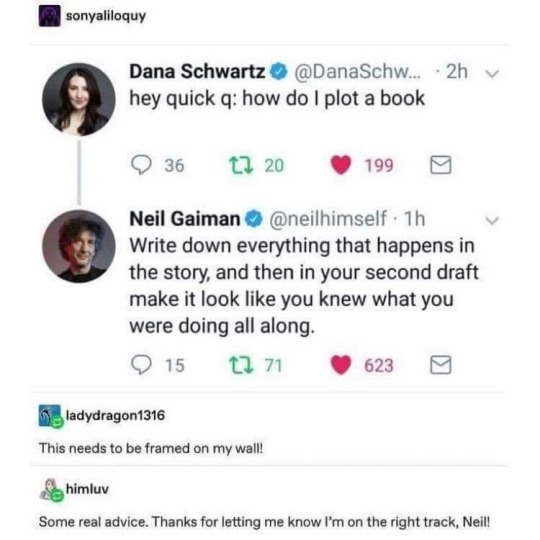
#writing tips#novel writing#writerscommunity#writersociety#writing advice#writer problems#writer things#writers block#writers of tumblr#storytelling#storytellers#writing#storyteller#writers#writerideas#writersoftwitter#stories#storyideas#writersoftumblr#badwriter
2K notes
·
View notes
Text

Your honor I present this as “evidence b” of Bad writing 101!
#writing tips#novel writing#writerscommunity#writersociety#writing advice#writer problems#writer things#writers block#writers of tumblr#storytelling#storytellers#writers#writing#storyteller#writerideas#writersoftwitter#stories#storyideas#writersoftumblr#badwriter
33 notes
·
View notes
Text
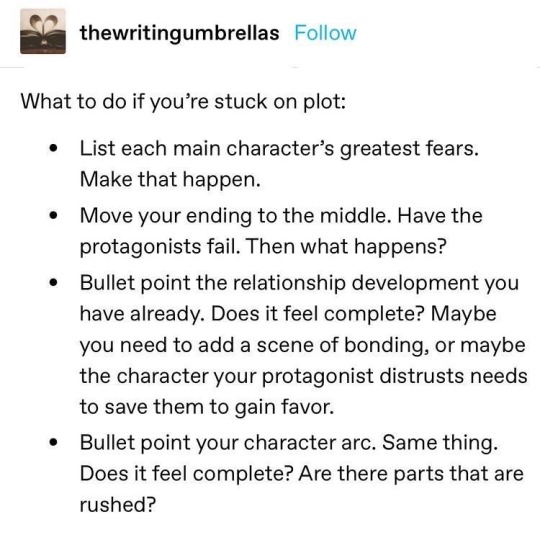
Stuck on your story’s plot? Try these tips
#writing tips#novel writing#writerscommunity#writersociety#writing advice#writer problems#writer things#writers block#writers of tumblr#storytelling#storytellers#writers#writing#storyteller#writerideas#writersoftwitter#stories#storyideas#writersoftumblr#badwriter
54 notes
·
View notes
Text

Write better multifaceted characters
#writing tips#novel writing#writerscommunity#writersociety#writing advice#writer problems#writer things#writers block#writers of tumblr#storytelling#storytellers#writers#writing#storyteller#writerideas#writersoftwitter#stories#storyideas#writersoftumblr#badwriter
728 notes
·
View notes
Text

Try this acronym tip to help with world building
#writing tips#novel writing#writerscommunity#writersociety#writing advice#writer problems#writer things#writers block#writers of tumblr#storytelling#storytellers#writers#writing#storyteller#writerideas#writersoftwitter#storyideas#writersoftumblr#stories#badwriter
2K notes
·
View notes
Text

#writing tips#novel writing#writerscommunity#writersociety#writing advice#writer problems#writer things#writers block#writers of tumblr#storytelling#storytellers#writers#writing#storyteller#writerideas#writersoftwitter#stories#storyideas#writersoftumblr#badwriter
476 notes
·
View notes
Text

Your bad writing could be from a use of these 11 words that you need to cut.
#writing tips#novel writing#writerscommunity#writersociety#writing advice#writer problems#writer things#writers block#writers of tumblr#storytelling#storytellers#writers#writing#storyteller#writerideas#writersoftwitter#stories#storyideas#writersoftumblr#badwriter
252 notes
·
View notes
Text
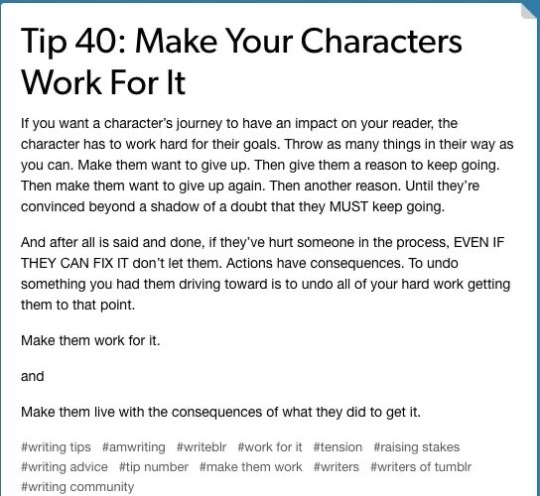
Creating that perfect character? Do this to really concrete your character in realism.
#writing tips#novel writing#writerscommunity#writersociety#writing advice#writer problems#writer things#writers block#writers of tumblr#storytelling#storytellers#writers#writing#storyteller#writerideas#writersoftwitter#stories#storyideas#writersoftumblr#writingideas#writingtips#badwriter
190 notes
·
View notes
Text
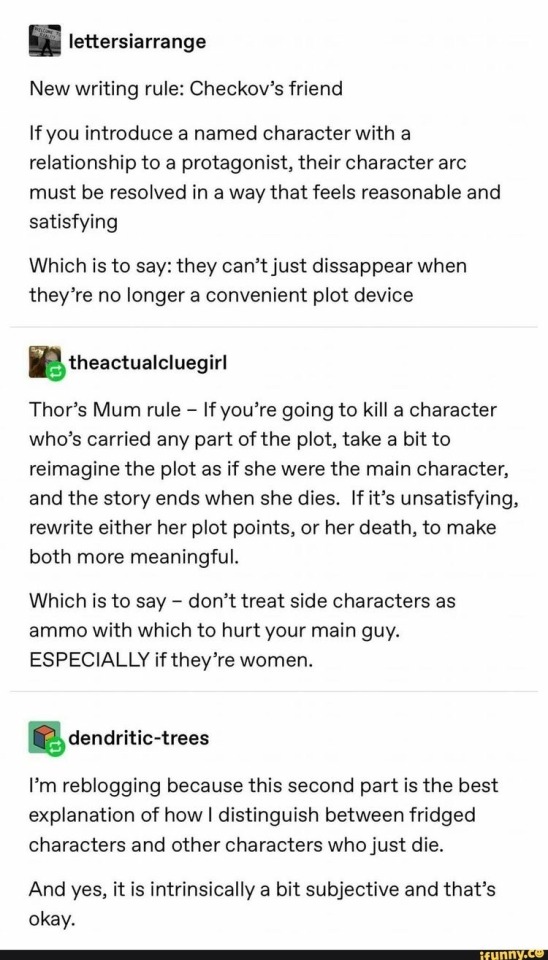
Thor’s Mum Rule…
#writing tips#novel writing#writerscommunity#writersociety#writing advice#writer problems#writer things#writers block#writers of tumblr#storytelling#storytellers#writers#writing#storyteller#writerideas#writersoftwitter#stories#storyideas#writersoftumblr#badwriter
1K notes
·
View notes
Text
god this scene i haven’t written would be so emotional if it came with 50k words of context i also haven’t written
#writing tips#novel writing#writerscommunity#writersociety#writing advice#writer problems#writer things#writers block#writers of tumblr#badwriter
82K notes
·
View notes
Text

This is a writing prompt if I’ve ever seen one!
#writing tips#novel writing#writerscommunity#writersociety#writing advice#writer problems#writer things#writers block#writers of tumblr#storytelling#storytellers#writers#writing#storyteller#writerideas#writersoftwitter#stories#storyideas#writersoftumblr#badwriter
2K notes
·
View notes
Text
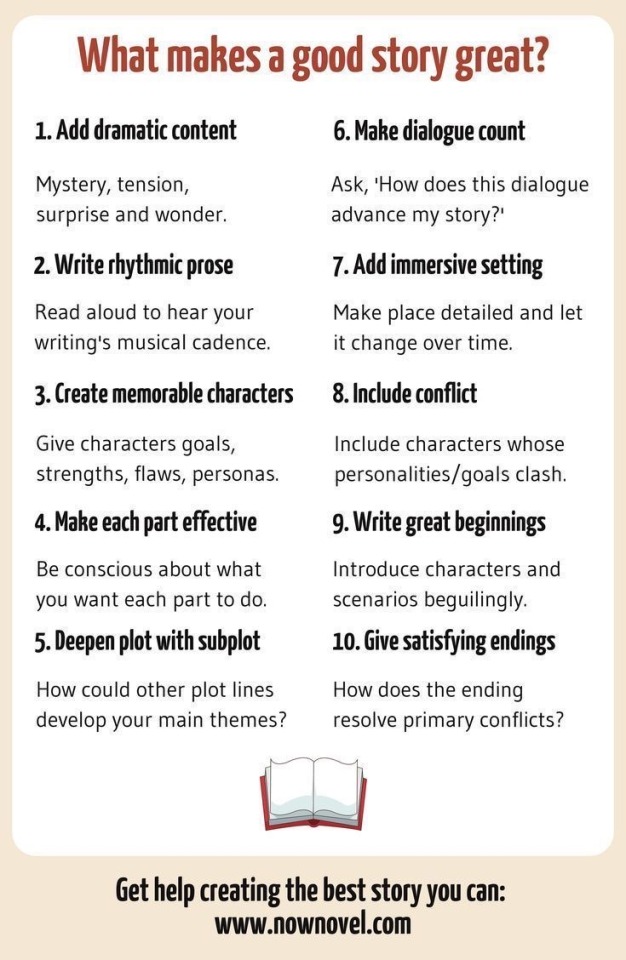
10 tips to make your bad writing, great bad writing!
#writing tips#novel writing#writerscommunity#writersociety#writing advice#writer problems#writer things#writers block#writers of tumblr#storytelling#storytellers#writing#storyteller#writerideas#writersoftwitter#stories#storyideas#writersoftumblr#writers#badwriter
39 notes
·
View notes